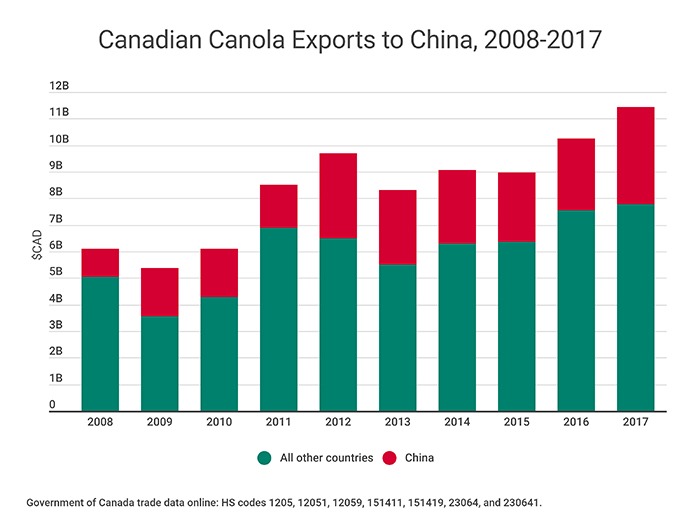The Impact Of Canada-China Relations On Canola Trade

Table of Contents
Historical Context of Canada-China Canola Trade
Early Growth and Importance
The growth of Canadian canola exports to China represents a significant success story in bilateral trade relations. Early agreements and burgeoning demand in the Chinese market propelled Canadian canola to become a key agricultural export, fostering economic growth for both nations.
- Peak Exports: At its peak, Canada exported billions of dollars worth of canola to China annually, representing a substantial portion of Canada's agricultural exports and a significant source of revenue for Canadian farmers.
- Economic Benefits: The trade provided significant economic benefits to both countries. Canada benefited from increased export revenues and job creation, while China secured a reliable supply of high-quality canola oil for its growing population.
- Early Trade Deals: Various trade agreements and diplomatic efforts facilitated the smooth flow of canola from Canada to China, establishing a foundation for mutually beneficial trade. These early successes highlighted the potential for expanded agricultural collaboration between the two countries.
Recent Tensions and Trade Disputes
Key Events and Their Impact
Recent years have witnessed a significant deterioration in Canada-China relations, significantly impacting Canadian canola exports. Key events include port inspections, import restrictions, and diplomatic disputes that have disrupted the flow of Canadian canola into the Chinese market.
- 2018 Import Restrictions: In 2018, China began imposing restrictions on Canadian canola imports, citing pest concerns. These restrictions resulted in significant losses for Canadian farmers and processors.
- Diplomatic Tensions: These trade actions were widely viewed as retaliatory measures in response to broader diplomatic tensions between Canada and China, particularly concerning the arrest of a Huawei executive in Canada.
- Economic Repercussions: The disruption in canola trade had profound economic consequences for Canada, impacting farmers' incomes, processing plants, and related industries. The uncertainty created significant challenges for long-term planning and investment.
Diversification Strategies and Market Adaptation
Exploring Alternative Markets
Faced with significant disruptions in the Chinese market, Canada has actively pursued diversification strategies to reduce its reliance on a single export destination.
- India and Europe: Canada has actively targeted alternative markets such as India and various European Union countries to expand its canola export base.
- Market Access Strategies: These efforts involve negotiations for new trade agreements, participation in international trade shows, and the establishment of strong trade relationships with importers in these new markets.
- Challenges and Successes: While diversification has yielded some successes, accessing new markets often involves navigating complex regulations, logistical challenges, and competitive pressures.
Technological Advancements and Product Development
Innovation plays a crucial role in mitigating future trade risks and enhancing market resilience.
- Improved Canola Varieties: Research into developing improved canola varieties with enhanced yield, disease resistance, and oil quality can improve competitiveness in global markets.
- Value-Added Products: Developing value-added canola products, such as specialized oils and biofuels, can create new market opportunities and reduce dependence on bulk commodity exports.
- Processing Innovations: Advances in canola processing technologies can improve efficiency, reduce waste, and enhance the quality of final products, making them more attractive to international buyers.
The Future of Canada-China Canola Trade
Potential for Reconciliation and Improved Relations
Despite current challenges, there remains potential for reconciliation and improved trade relations between Canada and China.
- Dispute Resolution: Finding amicable solutions to existing trade disputes is crucial for restoring trust and confidence in bilateral trade.
- Future Trade Agreements: The possibility of future trade agreements or renewed cooperation could facilitate the resumption of robust canola trade.
- Positive Signs: Any signs of improved diplomatic relations could pave the way for easing trade restrictions and restoring market access.
Long-Term Implications for Canadian Agriculture
The ongoing situation highlights the importance of long-term strategic planning for Canada's agricultural sector.
- Farmer Livelihoods: The impact on Canadian farmers' livelihoods underscores the need for government support and policies that promote resilience in the face of trade uncertainties.
- Global Agricultural Standing: Canada's ability to navigate these trade challenges will have significant implications for its global agricultural standing and competitiveness.
- Proactive Policy Adjustments: Proactive policy adjustments that encourage diversification, technological innovation, and robust market intelligence are essential to secure the future of Canada's canola industry.
Conclusion
The impact of Canada-China relations on canola trade has been profound, shifting from a period of significant growth and mutual benefit to one marked by uncertainty and disruption. Understanding the historical context, the impact of recent tensions, and the strategies employed to diversify markets is essential. The long-term implications for Canadian agriculture underscore the need for ongoing adaptation, technological innovation, and proactive policy adjustments. Staying updated on the evolving dynamics of Canada-China relations and their impact on the canola trade is crucial for future success in this vital sector. A focus on diversification, technological advancement, and strong diplomatic efforts will be key to navigating the complexities of this important trade relationship.

Featured Posts
-
 Strands Nyt Crossword Answers February 15 2024 Game 349
May 10, 2025
Strands Nyt Crossword Answers February 15 2024 Game 349
May 10, 2025 -
 Changes To Uk Visa System Preventing Work And Student Visa Misuse
May 10, 2025
Changes To Uk Visa System Preventing Work And Student Visa Misuse
May 10, 2025 -
 Fatal Racist Stabbing Woman Charged With Murder
May 10, 2025
Fatal Racist Stabbing Woman Charged With Murder
May 10, 2025 -
 Analyzing The China Market Why Bmw And Porsches Strategies Need Adjustment
May 10, 2025
Analyzing The China Market Why Bmw And Porsches Strategies Need Adjustment
May 10, 2025 -
 Find Live Music And Events In Lake Charles This Easter Weekend
May 10, 2025
Find Live Music And Events In Lake Charles This Easter Weekend
May 10, 2025
